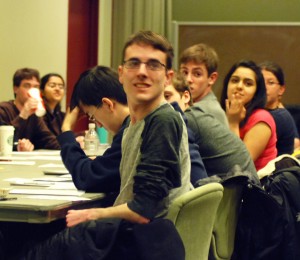
Senior Andrew Byrd, sophomore Calvin Yoon and other senators discuss ways to improve selection for the SA Professor of the Year award. Jessica Moon - contributing photographer
The Students’ Association Senate recently approved three clubs as SA-recognized groups: Running Club, Meliora Capital Management and Astronomy Club.
Formed in October 2009, Meliora Capital Management currently has 39 active members. Being SA-recognized will allow them to recruit students from all classes, especially underclassmen, for proper training in finance and investment. This is in line with their goal to be a networking tool for members and an educational arm for the University. The group also hopes to foster interest in finance among UR students.
Running Club, another recently SA-recognized group, organizes group runs on a weekly basis. The group currently has 25 active members.
The other group that gained SA recognition, Astronomy Club, was previously denied the status during the Policy and Review committee meeting. SA Senator and senior Andrea Sobolewski stated that the committee felt there was a large overlap of membership with Society of Physics Students. Additionally, she emphasized that the planning and leadership of the group could have been stronger.
President of the Astronomy Club and senior Joshua Brown clarified that they want to bring in students who are not normally part of the Physics department. To be a member of the SPS, students have to take at least one Physics course. The Astronomy Club feels strongly against implementing such a requirement.
“Even if there is one student who wants to join the Astronomy Club, but does not want to take a physics course, then the mission of the club is not being carried out,” Brown said.
Being SA-recognized will also help open the group to opportunities within the University community, such as access to the Wilmot Observatory. Professors may also be more apt to work with them.
In the end, the Policy and Review committee’s denial of SA recognition to the Astronomy Club was overruled, and the club was granted SA recognition.
Apart from the new clubs, the University should also expect to see protocol changes to the SA Professor of the Year award, as well as the creation of an SA Administrator of the Year award and a selection committee for the awards.
“For the past few years, I felt that the selection of the Professor of the Year awards through popular vote was extremely unfair and lacked sufficient criteria deserving of an award,” SA President and junior Scott Strenger said. “It was a personal goal of mine to create a fairer system that truly rewards individuals [who] improve the college experiences of my peers and myself.”
Previously, the popular vote system heavily favored large lecture professors, or professors who have taught the most students. Senator and junior Bradley Halpern expressed that there are a lot of excellent professors that can only be realized through the scrutiny of a selections committee.
“We all agreed it needed to be changed,” Speaker of the Senate and senior Dennis Nave said. “[It was] just how we wanted to change it.”
The main challenges facing the Senate were the structure of the selection committee and what would be the fairest process to bestow such important awards. Everything from the process of nomination to the people chairing the committee is expected to be discussed.
“I strongly believe it is important that the Senate debate such fascinating topics and reach a unified consensus,” Strenger said. “For these awards to be legitimate they need a legitimate selection process that has undergone serious examination and critique.”
The motion will be brought back to the Senate in the meeting next Monday.
Lim is a member of
the class of 2014.





